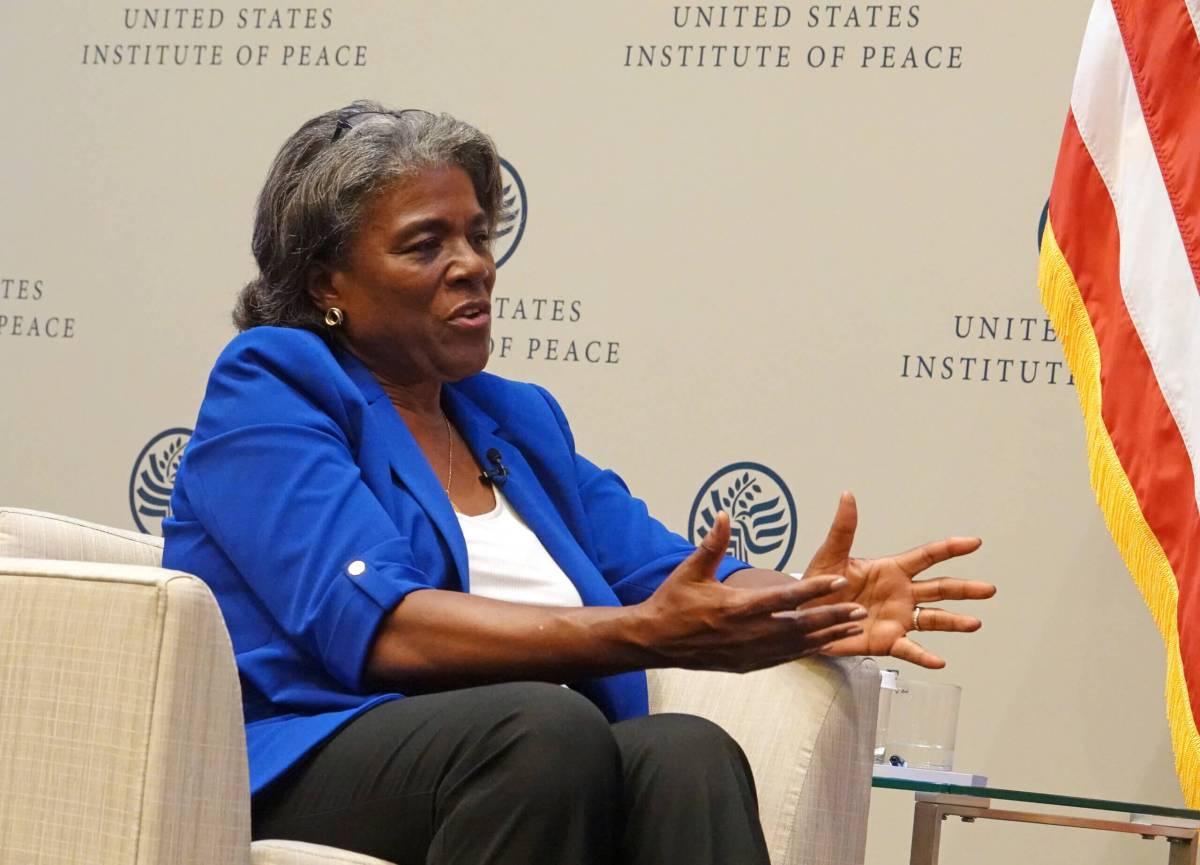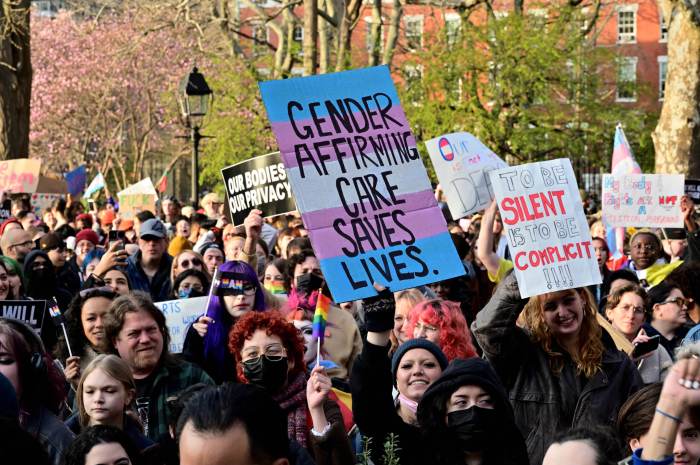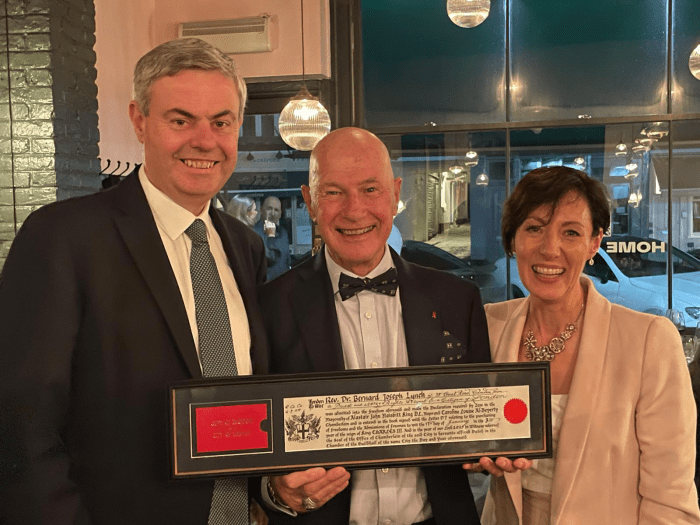Led by the United States and the United Nation.’s LGBTI Core Group and LGBTQ expert, a coalition of United Nations Security Council member and non-member countries urged the council to better protect queer and gender diverse people in its mandate at the Women, Peace and Security agenda March 20.
This was the second time in the Security Council’s history to address human rights violations against LGBTQ people. In a 2015 Arria formula gathering — which is an informal meeting convened by one or more Security Council members to hold open dialogues with non-council members — the council first heard Subhi Nahas, a gay Syrian refugee, and an anonymous gay Iraqi man’s testimonies, about threats, violence, and executions of LGBTQ people in Syria and Iraq by the Islamic State (formerly known as ISIS).
At a press briefing March 20, just before the meeting, Jessica Stern, who is the second-ever US special envoy to advance the human rights of LGBTQI+ persons, noted President Joe Biden’s commitment to LGBTQ rights at the forefront of US foreign policy when he took office in 2021 and again before the UN General Assembly in September 2022. She also noted that nearly every UN agency, treaty body, special mechanism, and senior official, including the Secretary General, “repeatedly acknowledged human rights violations based on sexual orientation and gender identity along with the need for inclusive development that leaves no one behind.”
However, Stern pointed out, the council has only once “formally recognized” the peace and security of LGBTQ people, citing the council’s news release responding to the 2016 massacre at Pulse Nightclub in Orlando.
“Now we turn to the Security Council, which has been one of the last bastions of silence on LGBTI issues,” Stern, who played a key role in supporting US Ambassador to the UN Linda Thomas-Greenfield’s process of bringing LGBTQ rights to the council, told reporters. “We must not look away.”
Along with deputy UN Secretary-General Jan Eliasson, Stern — then the executive director of Outright International — helped to bring LGBTQ issues to the Security Council in 2015.
Victor Madrigal-Borloz, the UN independent expert on sexual orientation and gender identity, called the Security Council’s absence of crimes against and inclusion of LGBTQ people in its work for peace and security a “proverbial blind spot.”
The Arria formula meeting was the first time ever that Madrigal-Borloz addressed the Security Council.
The Security Council heard from Madrigal-Borloz along with LGBTQ representatives from Afghanistan, Artemis Akbary, Colombia, Maria Susana Peralta Ramón, a representative from the UN LGBTI Core Group, and 15 member and non-member countries, 12 of which supported the resolution.
Thomas-Greenfield chaired the two-hour Arria formula meeting and introduced the proposed resolution in the ECOSOC Chamber at the UN Secretariat Headquarters in New York City earlier in March.
The meeting was open to all 193 representatives of UN member states and the 15-member security council, including the US, observers, and non-governmental organizations accredited to the UN The meeting was also broadcast live on UNTV.
Objections
China, Ghana, and Russia objected to the proposed resolution by stating there are other UN agencies and mechanisms that address LGBTQ rights. They claimed that LGBTQ issues did not meet the Security Council’s mandate.
China’s representative noted the 20th anniversary of the US invasion of Iraq, March 20, 2003, in its veiled remarks objecting to the meeting and including LGBTQ rights in the Security Council’s mandate.
She accused “certain countries [of] stubbornly clinging to the cold war mentality,” creating “ideological confrontation,” and “interfering in other countries’ internal affairs.”
Agreeing with China, Russia’s representative called sexual orientation an “individual choice.” He objected to the resolution, accusing some council members of inventing “new international legal concepts that are allegedly designed to close the gaps in the protection regime for the Geneva Conventions.”
Many council members and non-members, including the United Arab Emirates, did not get the opportunity to speak during the meeting. Thomas-Greenfield said she would collect their written statements.
In 2012, all Arab and some African states walked out of the Human Rights Council meeting in Geneva protesting a resolution supporting LGBTQ rights.
Representatives from the European Union, the United Kingdom, and other countries disagreed. The European Union’s representative noted 2023 marks the 75th anniversary of the Universal Declaration of Human Rights. He called the violence against LGBTQ people in wars “unacceptable.”
“This is a moment to recall that human rights are universal and that everyone is entitled to the respect and protection of their human rights without distinction or discrimination of any kind or on any ground or status, this includes sexual orientation and gender identity,” the E.U. representative said. “It is essential to go further in our efforts to protect the rights of all persons in the most vulnerable situations, including LGBTI persons. Violence against LGBTI persons must be prevented and eliminated.”
“[It] is only right that the Security Council is discussing this issue today,” the U.K. representative added before explaining the invisibility of LGBTQ people in the “systems and structures that are supposed to respond to conflict.”
“The impact of conflict on the LGBTI+ community is clearly an issue for the peace and security community to consider,” he said.
Thomas-Greenfield, just before entering the meeting on March 20, said “our hope is that this becomes formal.”
The meeting was co-sponsored by seven member countries (Albania, Brazil, France, Japan, Malta, Switzerland, the United Kingdom of Great Britain, and Northern Ireland), four non-member countries (Austria, Cyprus, the Czech Republic, and Greece), and the UN’s LGBTI Core Group. The core group has more than 42 member countries. The European Union, the Office of the UN High Commissioner for Human Rights, Human Rights Watch, and Outright International committed to advancing LGBTQ human rights at the UN
Queer people in war zones
The Arria formula meeting was the first time ever that Madrigal-Borloz addressed the Security Council. Last year, his office released its latest report, “Armed Conflict and Peacebuilding.”
Among some of the attacks against LGBTQ people in conflict zones around the world, Madrigal-Borloz described daily discrimination and “heinous forms of violence,” such as rape, public lashings, beheading, being burnt alive, blackmail, being pushed back into the closet, and forced marriages. He noted that these atrocities happen on “the back of deeply entrenched stigma” against LGBTQ people.
He argued that existing evidence “strongly suggests” that “deeply entrenched stigma” against LGBTQ people creates opportunities for violence against queer and gender-diverse people and to be used as pawns “to inflict damage on enemy forces or to subjugate communities or populations” in domestic and international armed conflicts.
Malta’s representative added that “digital technologies are also being used as a tactic of war to spread homophobic and transphobic messages in conflicts around the globe.”
Akbary highlighted the atrocities LGBTQ Afghans are currently facing under the Taliban, such as limited escape routes, and a cliffhanging story about one lesbian’s harrowing quest for freedom. He also noted the deaths of at least 64 Afghan asylum seekers in the Mediterranean Sea because of the lack of legal pathways to safety a week before the meeting.
The lesbian Afghan’s last words to Akbary were, “I’ve been in danger all of my life. All that I want from this life is freedom.”
That is where Akbary’s team lost contact with her, he said. The Afghan LGBT Organization’s search for her was unsuccessful.
Akbary founded and is the director of the Afghan LGBT Organization. His family fled Afghanistan to Iran in 1996 because they were persecuted for being Hazara, an Afghani ethnic group. He only faced more abuse and nearly died escaping with his life from Iran for being gay. He made it to Turkey and resettled in the Czech Republic.
He informed the council that the Afghan LGBT Organization has documented increased persecution and attempts to identify LGBTQ Afghans, public floggings, disappearances, and murders of queer Afghans since the Taliban regained power in Afghanistan in 2021. In 2022, the organization received 835 requests for help from LGBTQ Afghans.
“A society that discriminates [against] people because of their gender or sexual orientation is not a peaceful society,” said Peralta Ramón, a Colombian lesbian activist, lawyer, and scholar.
Peralta Ramón spoke about how the armed forces’ murder of a transgender woman protecting villagers became a symbol of how militia exerted control of a village.
LGBTQ voices in peace and security
“Resolving war is incomplete if issues of gender and sexuality are omitted,” said Peralta Ramón, who leads the peace and transitional justice team at Colombia Diversa, the country’s leading LGBTQ organization.
She spoke about Colombia’s potential model for inclusive and intersectional peace building with LGBTQ, women, and other marginalized people based on the 2016 peace agreement with the former rebel group Fuerzas Armadas Revolucionarias de Colombia-Ejército del Pueblo.
Colombia’s peace building success has been the result of soliciting feminist, LGBTQ, and other organizations representing marginalized groups to include and implement their ideas in the peace building process. The process isn’t complete, but ongoing. She noted that women and LGBTQ victims during the conflict are still waiting for justice as the Special Jurisdiction for Peace’s macro-case has yet to formally open in Colombia.
The representative of The Kingdom of the Netherlands, who also represented Belgium and Luxembourg, applauded the bravery of local LGBTQ activists and organizations in wars.
“Where the international community has failed to adequately meet these obligations, brave LGBTI human rights defenders and civil society actors have stood up,” he said. “They became the lifelines of their community’s offering protection, humanitarian assistance and other forms of support to LGBTI persons, including LGBTI refugees.”
The representative of the LGBTI Core Group added, “Member States and other stakeholders are learning how to harness this expertise and how to incorporate LGBTI persons in conflict resolutions and constructions as well as these buildings efforts.”
Stepping up
“To put it bluntly, this is horrific,” Thomas-Greenfield responded to Akbary, Peralta Ramón, and Madrigal-Borloz’s descriptions of the monstrosities LGBTQ people experience in armed conflicts and wars. “These actions foment hate, they support violence, and are an affront to the principles of freedom and human rights. They also destabilize whole societies.”
“The simple fact is, the threats LGBTQI+ people face around the world are threats to international peace and security,” said Thomas-Greenfield. “[This] is why we need to do our part, as individual member states and collectively as the United Nations Security Council.”

































